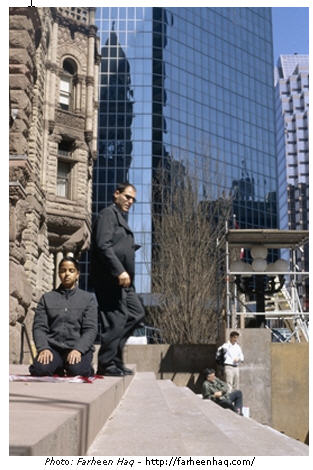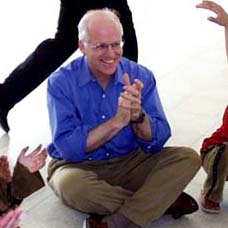
"Since 9/11, I have worked at Is-lamic Circle of North America with a range of clients affected by the disaster—over 735 detainees and their families. My two case workers have worked with further hundreds of people displaced by the disaster and its aftermath, as well as a range of Muslims traumatized by loss of family members or simply by the images of disaster. We have been responding to backlash with emer-gency financial assistance and with advocacy, with ever-dwindling re-sources. Of course it is one crisis af-ter another."
Morocco RPCV P. Adem Carroll writes: Some Thoughts on "Post-9/11"
Some Thoughts on "Post-9/11"
By P. Adem Carroll
Time and Place
I sit at my cluttered desk, before the rush of clients and calls. How am I to collect myself, to write this? I stop. And listen, deeply in my bones. O Allah, the Compassionate and Merciful. Awareness flickers. Float-ing for a minute, I exist in space. But I live in time, as well. And I am to consider the effects of this rather hectic time we label “post-9/11.” We all share this challenging time; I can only remember a small part of it. The rest is in you, for your own re-membrance, God willing.
Since 9/11, I have worked at Is-lamic Circle of North America with a range of clients affected by the disaster—over 735 detainees and their families. My two case workers have worked with further hundreds of people displaced by the disaster and its aftermath, as well as a range of Muslims traumatized by loss of family members or simply by the images of disaster. We have been responding to backlash with emer-gency financial assistance and with advocacy, with ever-dwindling re-sources. Of course it is one crisis af-ter another.
I find myself somewhat unwill-ing to rehearse the tragic stories that concern me daily. For the most part, families prefer to keep their crises quiet. However, some of them sense that their suffering is part of a larg-er pattern, and speak out against civil liberties abuses and injustice. It is inspiring to see them empowered on behalf of their families and com-munities, at a time when immigrant Muslims are demonized as a na-tional security threat.
However, with a frequent lack of emotional support, still other men and women are ashamed, or too frightened to speak to media, or even to seek out help. Just yesterday one man who had simply overstayed his visa was afraid to see a lawyer, though we had asked her to see him for free. And another man, a citizen who only knows the first man slightly, was so unnerved by the Homeland Security visit to his home that he packed up his children and brought them to the mosque where ICNA offices are based. The fear has penetrated the community deeply. The level of anger is increasing.
Our many partner community groups offer frequent legal presentations in mosques and community centers, making clear that no one else has to speak to law enforcement without a lawyer present. But somehow, we still see families allowing officers into their homes without a warrant—or else the officers simply walk in. Family members feel pressured to talk.
These are not terrorists, of course; often they are caught in the considerable red tape of ICE immigration services. Some are victims of Kafkaesque bureaucracy, and some are clearly out of status and waiting for the next immigration amnesty. Almost all are hardworking people with families. But the government con-siders immigration status violations as a “gateway to al-Qaeda.”
Community and Culture Wars
Confronted daily by neighbors’ needs, I have consistently been disappointed in the local Muslim community’s limited abil-ity to coordinate and develop services for its people. In part this is a failure of leadership, made difficult by our considerable diversity in ethnicity and religiosity. Further, we find ourselves distracted again and again. It’s not only that we must cope with the attacks on Muslims in the media here and abroad, the uncertain identity of many immigrant Muslims and the demands on them to assimilate, and the broad range of pressures on African-American Muslims. We must also contend with our own culture wars on a variety of social is-sues. We lose the solidarity needed to address the immediate crises fac-ing us. We are divided. Whom shall we blame for this?
Last fall I attended an inter-esting conference of young for-ward-thinking Muslims called “Muslim Leaders of Tomorrow.” I was part of a panel convened to discuss the civil liberties crisis. As I recall, not one of these “pro-gressive” Muslims attended the panel; we canceled it. Interest-ingly, the vast majority instead attended a debate on the role of women.
Shocked, I thought perhaps that it was a matter of social class, that these particular leaders and activists were cushioned against the harshness of immigration laws. But I have since not-ed the amount of time and energy spent debating such issues as homosexual marriage and women-led prayer on various listservs that are designed to link Muslims and strengthen community. Meanwhile non-“progressive” Muslims on these lists display fre-quent intolerance for diverse opinion, as well as heroic at-tempts to maintain proper Islamic decorum. This may be healthy if somewhat inconclusive discussion. But as I have sug-gested, we are distracted from unified action.
One can easily point to other examples of unhelpful con-troversy. For instance, as a culmination of several years’ serious research and consultation, a coalition of Women in Islam, Council on American-Islamic Relations, and Islamic Social Ser-vice Associations of Canada has recently brought out a useful pamphlet entitled “Women Friendly Mosques”: it has caused a minor uproar. Misunderstanding this document, and overesti-mating its threat to patriarchy, local Muslim newspapers condemn it in reactionary terms as advocating “co-ed mixing.” As usual, much noise—and little listening. But to strengthen our community, there must be accommodation and a significant role for women in the mosques of the United States. It will not happen overnight, however.
Is this inevitably part of being a Muslim in the USA, to engage in this debate about the private and the public, the individual and the collective? Sadly for a religion so rich in devotional practice, there usually seems less interest in spirituality than in political issues, and no clear link between the two. Even today on my e-mail listservs the culture war arguments are raging.
Mosques have been slow to develop as sources of social services. Most Islamic centers are still served by volunteer imams, who have not developed accountability and trust beyond a very narrow circle of supporters. Unfortunately this lack of transparency can be misinterpreted by those who are inclined to disparage Muslims. Of course, even so-called moderate Muslims are not immune to attacks from far-right media and think tanks. Under the influence of these lobbyists, elected officials refuse to meet with Muslims, andmoreover give credence to the idea of a vast Muslim conspiracy. Congressman Peter King of Long Island claims that eighty-five percent of mosques are extremist! Which is absurd—yet a majority of mosques are not up to intellectual standards or social needs.
My agency was funded by the Red Cross to provide workshops at mosques around New York City on a variety of subjects, including stress relief and access to services for un-derserved communities. Our case workers and part-time student out-reach workers have connected with a variety of African and Bangladeshi mosques, completed 300 commu-nity needs surveys, and made some very successful presentations. Still we note the level of resistance to anything new, however useful. We have far to go. Perhaps this is a challenge to embrace with less trepidation, and with more joy?
Recently my staff added several speakers and workshops to the Islamic Circle annual convention in Hartford, Connecticut. We also added a Red Cross blood drive and a health fair. The convention was very dynamic, with at least 6,000 Muslims at-tending the many workshops, discussions, award presentations, and prayers. Interestingly, there was more interest in interfaith dialogue this year than before. There were new demands artic-ulated for more local services, and more unity.
Still, some of the old guard seem threatened by the new in-clusive spirit. Women’s dress code was once again rather rigid-ly defined. One detects a return of the old insularity. Are we con-demned to action and reaction forever?
Some Thoughts on Freedom
Last month I received this letter from detainee Uzair Paracha, held in isolation at the Metropolitan Correctional Center (MCC) in Manhattan.
About recreation I haven't had a breath of freshair in about fourteen months…. I was moved towhere fresh recreation is prohibited and for recreationwe are simply taken to an empty room—smaller thansome cells here—for an hour a day. Naturally mostof us decline the offer until it becomes unbearable tostay within a cell for weeks 24/7. Because of this andother factors, my health has been continuously de-teriorating. For about a year I have been reportingbreathing problems, muscle spasms as stress reactionsto the heavy psychological pressures....
The overall impact has taken a heavy toll onmy health—for some time now I have lost my appetite,been losing weight, have hardly eaten for weeks,I experience blackouts, weakness, lightheaded be-cause I haven't even had a snack in these weeks,just bits of food to survive.... I believe that all theseproblems are because I haven't had fresh air infourteen months. But sadly theywill walk their dog because itneeds fresh air but they thinkwe don't need it.... I may soundtoo excited but at times it getsunbearable even right nowsometimes it is hard to standwithout support and I'm onlytwenty-five.
Moreover, like so many sus-pects in federal custody after 9/11, Uzair’s contacts with family have been severely limited by the au-thorities. He writes,
For twenty-two months of my confinement I was never penalized for any disciplinary violation but when I obtained a court order to allow me family visits and since then re-ceived two disciplinary sanctions and have been al-lowed only four visits (although allowed weekly otherwise) in six months and have been penalized already for the next six months. Every time it is the visits that are taken, sometimes adding loss of calls to my mother. You may be surprised to know that these violations are for normal talking to another prisoner (even though false).
Interestingly, I received a call from another MCC detainee’s wife this week as well. She also mourned that this same federal prison had not allowed her to visit her husband in the two months since his arrest. He is also limited to one call per month. It seems clear that, no matter what officials say, the brutality of the prison system is being used to break down detainees - even before charges are filed. In this way, detention becomes a form of interrogation though mistreatment.
Why avoid the word? It is a form of torture. We see it being institutionalized throughout the system, from the gulags of Guantánamo and Baghram to only God knows how many secret dungeons. We see unethical misuse of psychologists, and vast cover-ups in the name of the “war on terror.” Government reports try to argue away the definition of torture, and only today an Appeals Court has ruled that Guantánamo Bay detainees may indeed be tried by military commissions, out of reach of US law.
Those of you who oppose this—are your voices reaching your elected officials? Are you empowered or intimidated? Are you distracted by your personal lives? Are you speaking out? Are your and our faith leaders speaking out effectively?
My old client Nabil al Marabh was disappeared after his de-portation from US jails. He had been to an Afghan training camp fifteen years ago. Suffering in Brooklyn’s MDC as a material wit-ness after 9/11, without access to a lawyer for eight months, and then finally deported on an immigration charge only, he was seized by Syrian intelligence after reporting for a medical test to allow him to obtain documentation. He has not been heard from since April 2004. His family was too afraid to report this even to other relatives for over a year, and so I was not able to alert Amnesty International until April 2005. Still no word. I had spoken to him so many, many times—his voice from prison and his earthy jokes are so familiar to me even now. He asked me to watch out if this were to happen. Now I feel it may be too late. There is silence on the other end of that phone line. Now the spiral of violence con-tinues. We grieve for the bombing victims in London, in Iraq, and around the world. We yearn for education that recognizes human value not as commodity but as emotional and spiritual intelligence.
Before we flee to the next article, the next subject, the next pursuit of happiness, let us all put down our baggage for a minute, and listen to our breath. It is with us for only a short time.
May we breathe in freedom; may our words bring light to dark places. May we listen to each other and not give up on human rights, on the essential value of each individual.
What will we do together to protect this gift from the forces of fear and post-9/11 reaction? Is it too late?
P. Adem Carroll has been 9/11 relief coordinator for the Islamic Circle of North America (ICNA Relief) since September 2001. Since completing Peace Corps service in Morocco and receiving a Master’s degree in Near Eastern Studies at NYU, he has served as a teacher, nonprofit program director, and human rights advocate. As ICNA Relief representative, he co-produces a monthly radio show on WBAI in New York and writes a weekly column in the Muslim press.





















